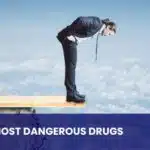
It’s estimated that over 50% of all Americans know someone with a drug addiction. Substance abuse is a global crisis, not exclusive to the United States. It’s not always as apparent as expected, but you must see a doctor if you suspect you have this issue.
Addiction is a complex issue, and there is no clear answer to whether a person can be an “addict.” However, if you think you struggle with compulsive behaviors you can’t control, you may be an addict.
Let’s know in detail.
What is Addiction?
According to the American Society of Addiction Medicine, addiction is a diagnosable medical disorder.
The word “addict” refers to a person who has become physically dependent on one or more substances. This dependence may lead to the inability to cope in situations that would otherwise be relatively easy, which is why people may feel helpless.
When referring to substances, people often focus on alcohol and drugs. They may also include other substances, such as food or work. However, the definition of substance dependence is generally broad enough to have any substance you regularly consume, even if it is only occasionally.
If a person is addicted, it doesn’t necessarily mean they will become dependent. The process is quite complex, and you don’t have to be in danger of becoming addicted. The person can take the risk.
In any case, addiction is not something you choose or decide to have. It’s an illness you cannot control and cannot change.
In most cases, there is no way to stop an addictive behavior without going through withdrawal symptoms. You have no control over when these occur, but they will likely make you uncomfortable. So it would be best to get through them as quickly as possible.
Difference Between Dependence and Addiction
Dependency occurs when the body becomes used to a particular substance (alcohol, drugs, etc.) over time. You may even find it difficult to wean yourself off of the substance. However, if you consume too much of a substance, you will develop a dependence on it and become dependent on it to function.
For example, a person with an alcohol addiction will have problems even with a drink or two a day. A true addiction occurs when the body becomes addicted to a substance or situation. An addict does not have a physical dependency on the substance; instead, they experience a psychological or emotional dependence.
As a result, they will continue using the substance despite the negative consequences. If the substance is stopped, the addict will go through withdrawal symptoms that will force them to retake the substance to avoid having withdrawal symptoms—resulting in a vicious cycle of taking the substance in fear of the withdrawal symptoms.
If someone you love begins to display addictive behaviors, it’s essential to understand what’s happening to help them. Some examples of addictive behaviors include cigarettes, alcohol, prescription painkillers, eating more than what’s healthy, excessive gambling, and shopaholism.
Causes of Addiction
Warning Signals for Addiction
According to the peer-reviewed journal Evaluation and the Health Professions, “the fundamental sign of addiction is a decline in control over the capacity to make decisions linked to quitting or sustaining particular acts,” resulting in “bad consequences.” Thus, it follows that addiction must have some behavioral element.
The American Psychiatric Association’s (APA) Diagnostic and Statistical Manual of Mental Disorders (DSM) is the gold standard for diagnosing mental health conditions. There are 11 indicators used to diagnose substance abuse disorders in the DSM-5, the current edition.
According to NIDA’s guidelines, at minimum, two of these characteristics must be active for 12 months:
- Difficulty in abstaining from drug use despite having an incredible urge for it or making several efforts to achieve it.
- Increasing one’s dosage or frequency of drug use beyond what was prescribed.
- Drug cravings.
- Considerable time invested in drug-seeking, drug-using, and drug-recovery activities.
- The involvement in leisure and social activities used to be highly regarded but is now often substituted by things associated with drug misuse.
- Using drugs regularly while you’re in potentially dangerous circumstances.
- Continued drug usage is problematic due to its detrimental effects on interpersonal connections and other aspects of one’s life.
- Chronic drug use despite awareness of adverse mental, interpersonal, and bodily effects.
- Neglecting one’s responsibilities at work, school, or home because of drug usage.
- Tolerance develops in the body to a substance when its effects diminish with repeated usage, and more of the drug is required to achieve the same high.
- When the effects of a drug fade away, the user may experience withdrawal symptoms such as stomachaches, headaches, despair, stress, sleeplessness, heart rate and vital signs fluctuations, irritation, restlessness, and exhaustion.
Bottom Line
Addiction can ruin lives, destroy relationships, and prevent you from living meaningfully. But there is hope! And you don’t have to wait until the damage becomes irreversible.
Sources:
Author
-
Dr. Williams has held senior leadership positions in the behavioral health field for over 30 years. He has worked with diverse populations in various private and public sectors.
View all posts
-
Dr. Saman is a mental health writer with over six years of experience in freelance writing, editing, and proofreading. She is a practicing healthcare professional holding a doctorate on physical therapy at DOW University of Health Sciences.
View all posts













